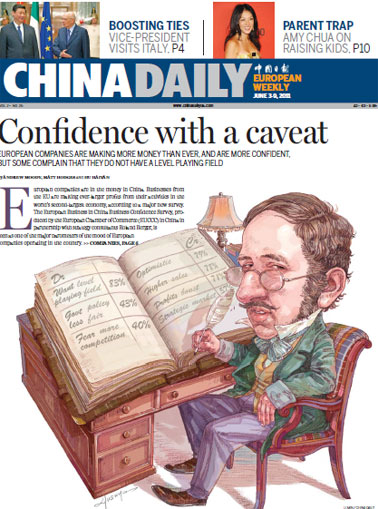Society
EU to aid farmers hurt by E.coli outbreak
Updated: 2011-06-07 08:22
(Agencies)
BRUSSELS - European Union farm ministers will try on Tuesday to agree financial aid for fruit and vegetable producers whose sales have been hit by an E.coli outbreak that has killed 22 people in Europe.
While the structure of the compensation package and the amount of aid have yet to be defined, the European Commission said on Monday it expected the ministers to reach a provisional agreement at an emergency meeting in Luxembourg.
"I'm not sure that we will actually have a legal proposal on the table tomorrow ... I think our hope is that we can reach an agreement in principle," the Commission's agriculture spokesman Roger Waite told a press briefing in Brussels.
| ||||
German scientists found no traces of E.coli at an organic vegetable farm believed to be the source of the outbreak, but said this did not mean their suspicions were wrong.
Even though first lab tests on bean sprouts from the farm were negative, officials said they were not surprised because any contaminated produce could have been long since distributed.
"This is an important lead that we're vigorously pursuing," federal Agriculture Minister Ilse Aigner said in Berlin on Monday after the state agriculture ministry in Lower Saxony state said the 23 samples tested so far had been negative.
Aigner repeated warnings to consumers to avoid bean sprouts, cucumbers, tomatoes and salad.
Scientists say the contamination may have been on or in the bean seeds themselves, or in the water used to grow them, or have come from a worker handling them.
"Bean sprouts are not an uncommon cause of food poisoning," Paul Wigley, from the University of Liverpool's School of Veterinary Science, told Reuters.
He said the US Centers for Disease Control and the US Department of Agriculture had long been concerned about risks associated with bean sprout production.
"Both E. Coli and Salmonella outbreaks have been linked to sprouts in the United States and in Britain," Wigley said.
Compensation
In Brussels, one EU source said the most likely solution for financial aid being discussed was to extend an existing EU crisis prevention scheme that compensates fruit and vegetable producers for withdrawing products from the market.
Under this plan, until the end of June EU producers would receive about 30 percent of the total value of unsold products in financial aid paid directly from the EU budget, though the exact percentage was still being discussed, the source said.
Spain's deputy prime minister has threatened legal action against German regional authorities for wrongly identifying Spanish cucumbers as the source of the contamination, but the Commission insisted the crisis had affected all EU producers.
"We've seen a drop in consumption. There was already a problem with consumption before any comment was made about Spanish cucumbers," said the Commission's Waite.
"The important point as far as we're concerned is that we find an EU solution to what is an EU-wide problem ... that supports all fruit and vegetable producers across the Union."
On Monday, Spain's fruit and vegetable industry group Fepex said its farmers lost 175 million euros ($256 million) in exports and 50 million euros in domestic sales in the first week after German officials blamed Spain for the outbreak.
EU fresh produce association Freshfel Europe said the latest national estimates put the weekly economic damage at about 200 million euros in Spain, 80 million in the Netherlands, 20 million in Germany, 4 million in Belgium and 3 million in Portugal.
"Dutch vegetable exports have come to a standstill," Dutch junior minister for economic affairs Henk Bleker said.
EU trade in fresh fruit and vegetables is worth about 2.5 billion euros per week, and the fresh vegetable sector has been hardest hit by the crisis, Freshfel said.
"We are still hoping that the EU will make promotional funds available on top of (aid to producers), in order to restore consumer confidence in the sector," said Freshfel's food safety adviser Frederic Rosseneu.
French retailer Casino said cucumber sales in its French stores fell by 20 percent last week, but sales of other fresh vegetables were up 2.6 percent during the same period.
Britain's biggest retailer Tesco said sales of salad and fresh vegetables were unaffected by the crisis, and added that most of its fresh produce was from British farms.
E-paper

Harbin-ger of change
Old industrial center looks to innovation to move up the value chain
Chemical attraction
The reel Mao
Improving app-iness
Specials

Vice-President visits Italy
The visit is expected to lend new impetus to Sino-Italian relations.

Birthday a new 'starting point'
China's national English language newspaper aims for a top-notch international all-media group.

Sky is the limit
Chinese tycoon conjures up green dreams in Europe with solar panels




